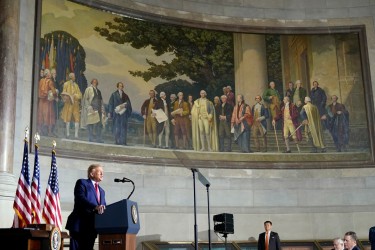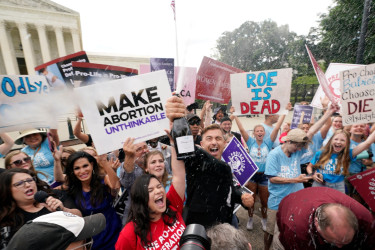The Wall Street Journal has an incredible story today. The National Archives museum, under Biden-appointed U.S. Archivist Colleen Shogan, has been working to reshape its narrative of American history in order to make white conservatives more comfortable. The Journal describes a pattern of efforts to shape its newest upcoming exhibits to better fit right-wing narratives of U.S. history. The museum has removed references to Martin Luther King Jr., Japanese internment, Native Americans, union organizers, and birth control, because presenting American history honestly would make Republicans upset.
The changes to the new exhibits are remarkable. A photo of King was replaced with one of Richard Nixon meeting Elvis Presley. A “proposed exhibit exploring changes to the Constitution since 1787,” including “amendments abolishing slavery and expanding the right to vote,” was reduced in size, and employees were told that “focusing on the amendments portrayed the Founding Fathers in a negative light.” Shogan “told employees to remove Dorothea Lange’s photos of Japanese-American incarceration camps from a planned exhibit because the images were too negative and controversial, according to documents and current and former employees” and her aides “also asked staff to eliminate references about the wartime incarceration from some educational material.” An exhibit on coal communities “cut references to the environmental hazards caused by the mining industry.” Shogan’s aides “also ordered the removal of labor-union pioneer Dolores Huerta and Minnie Spotted-Wolf, the first Native American woman to join the Marine Corps, from the photo booth, according to current and former employees and agency documents.” A photo of Betty Ford wearing an Equal Rights Amendment pin was removed from a video, and in an exhibit of “patents that changed the world,” the birth control pill was replaced with, of all things, the bump stock. The Journal notes that "Shogan’s changes have delayed the opening of new exhibits, initially set for next summer, and are expected to add at least $332,000 to costs."
The explicit justification here was that the facts would hurt the feelings of guests who didn’t want to hear about union organizers and Native Americans. Visitors shouldn’t “feel confronted,” the Archivist said, but rather “welcomed.” Of course, Japanese Americans or Native Americans are unlikely to feel “confronted” by exhibits on their history, so the archivist was clearly referring to making white conservatives feel more at ease. In fact, an employee was specifically “told to look for success stories about white people.” And, looking over an exhibit about westward expansion, Shogan asked a staffer “Why is it so much about Indians?”








